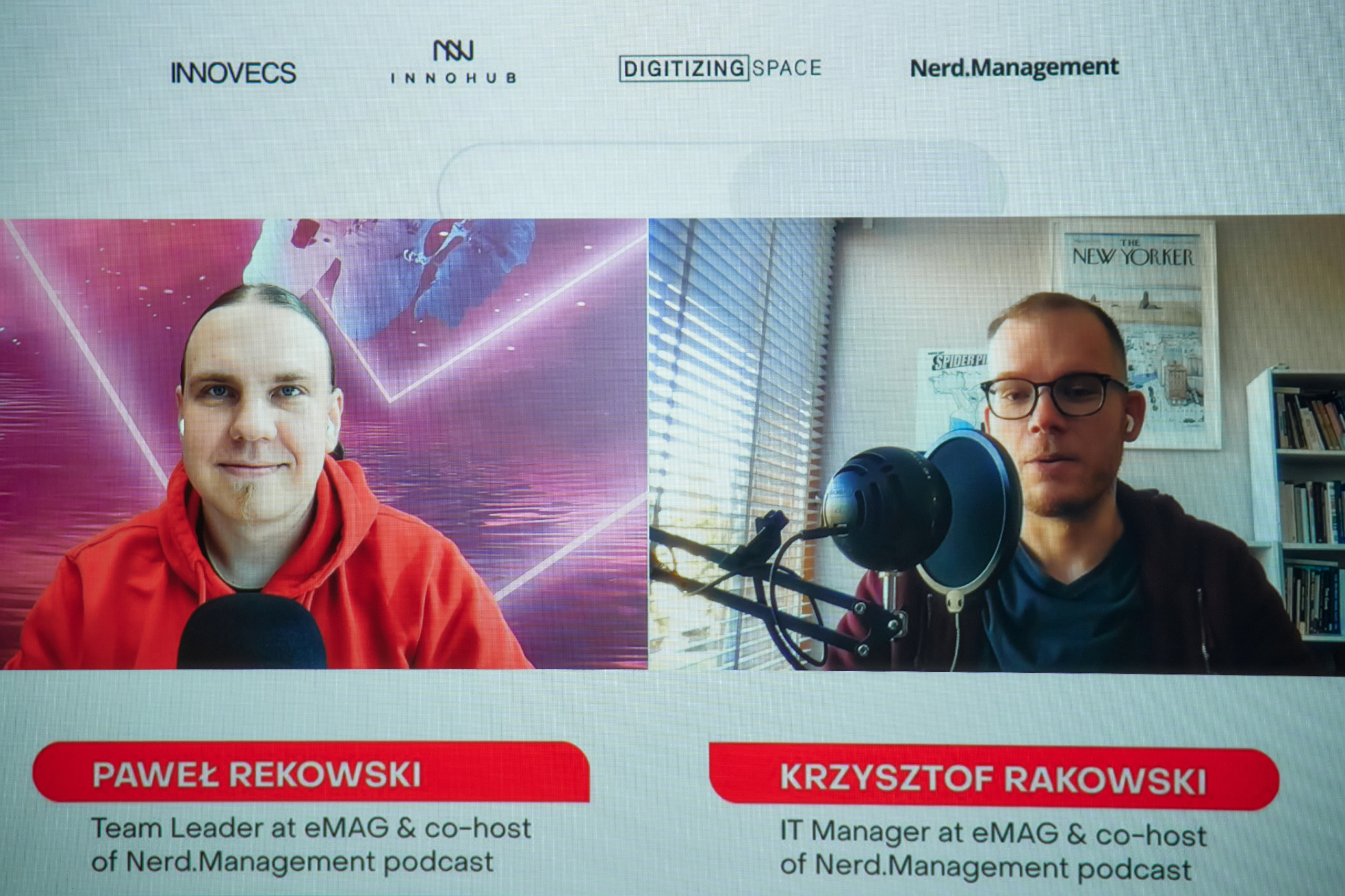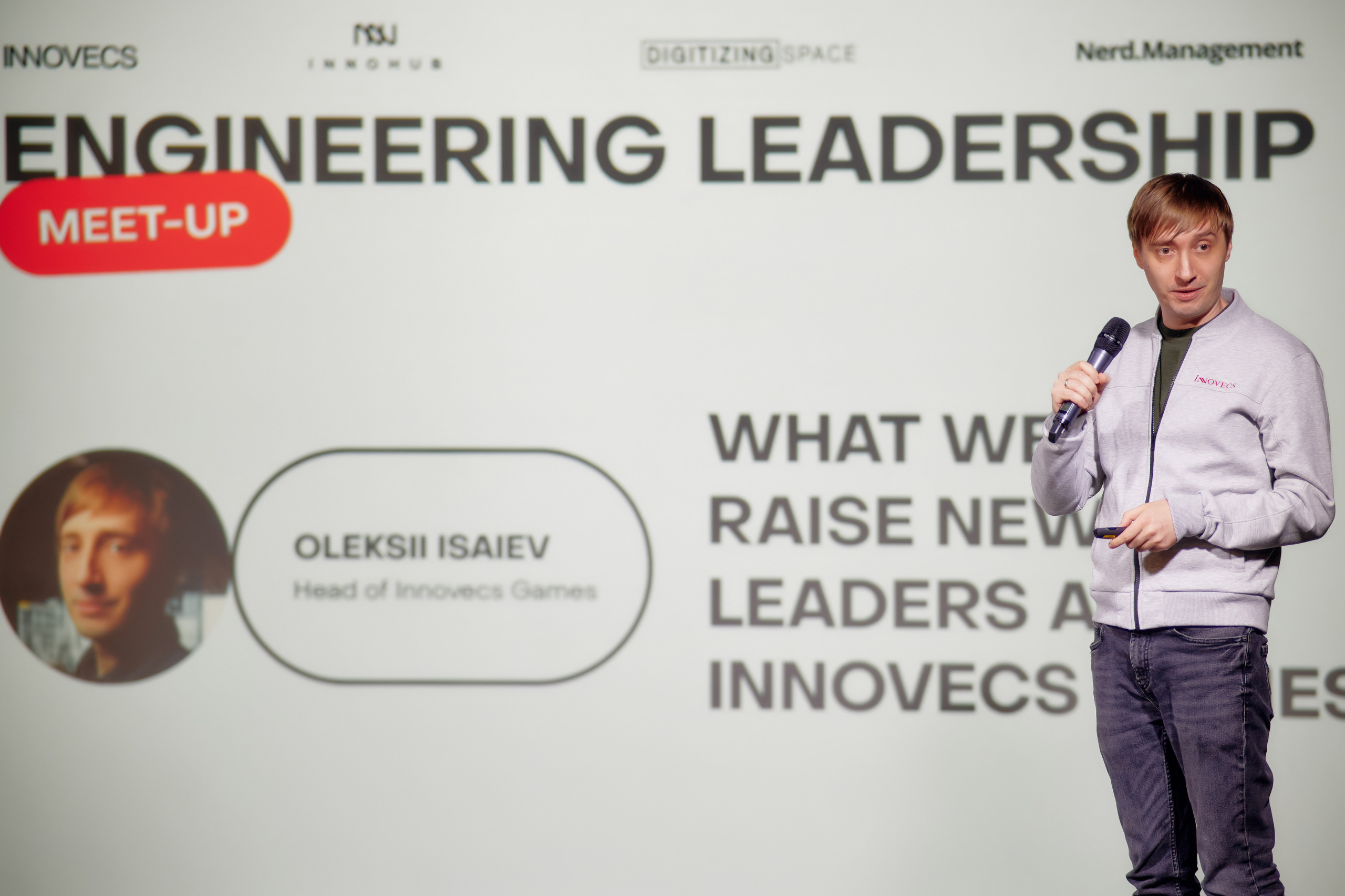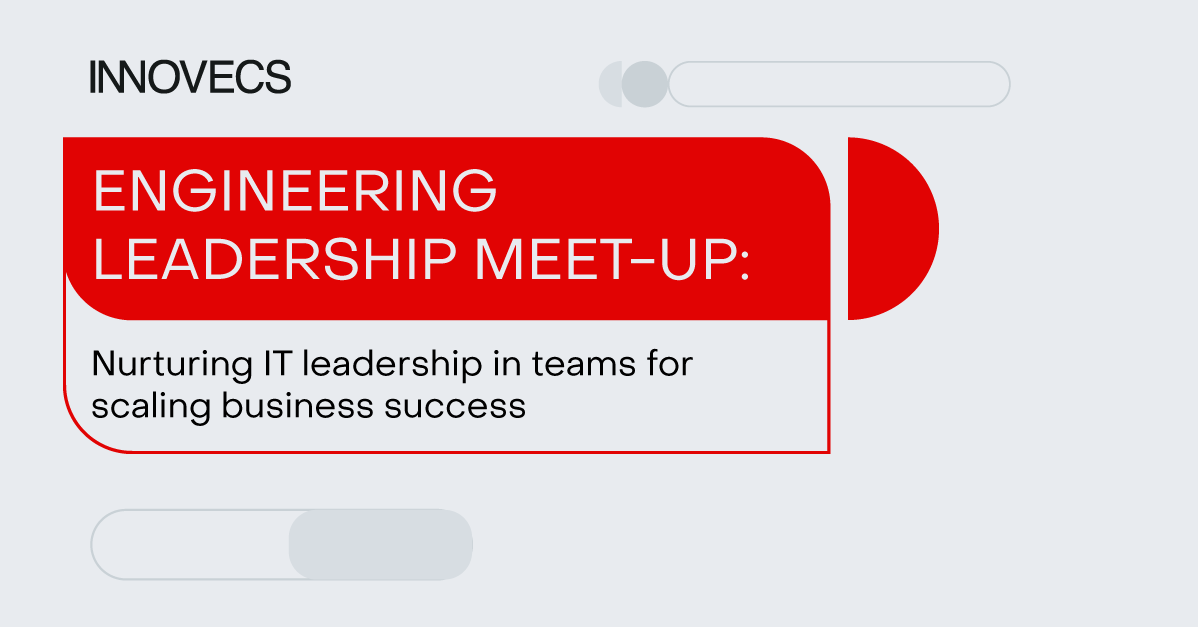It is becoming increasingly complicated to reach business goals within the conditions of skyrocketing IT market growth. Engineering Leadership and teams having deep technical expertise are essential factors which affect a company’s rating in the IT market.
What are the most effective tactics of team and project management? What challenges do Engineering Managers face and how do they tackle them? Are leaders able to keep a well-being balance when working remotely? These are the key topics the Engineering Leadership Meet-up touched upon on September 21 at InnoHub.
Our brightest speakers were Oleksii Isaiev, Head of Innovecs Games, Anastasia Sylenok, a Co-Founder of Digitizing.Space company, Nataliia Zub, Head of Manufacturing, Supply Chain and Logistics at Innovecs, Paweł Rekowski and Krzysztof Rakowski, co-hosts of Nerd.Management podcast.
Apply here to get the recording of the Engineering Leadership Meet-up.
A leader is one who knows how to communicate effectively
In a presentation about the Peculiarities of Communication Between Involved Parties, Nataliia Zub, Head of Manufacturing, Supply Chain, and Logistics at Innovecs, said that almost all challenges faced by Engineering Managers in their daily routine are related to communication.
Remote team management, delegation and precise communication of expectations, and understanding of stakeholders’ different mentalities, are key aspects depending on the communication skills of a leader and one`s team.

Nataliia advised; “Less control, more delegate”. Before starting a project managers should raise several essential questions:
- How much effort is required for this job?
- What would be the best outcome for you as a leader?
- Did you communicate your expectations clearly?
Nataliia outlined that, “A good answer is the result of a good question. Sometimes developers ask about customers` preferences regarding certain technical details instead of identifying needs and offering decisions. As a leader, you should not ask, but rather, propose. Therefore, a leader leads a conversation. You can assume customers’ preferences and propose, for example, a color that, from your point of view, will be the best for the button. And this is the answer that the customer expects. He needs your expertise”.
The stakeholder’s views are crucial in communication. Regarding this aspect, the speaker used a case about scroll bars to illustrate. The engineer`s team suggested the customer modernize the front end of the project to improve user experience.
A handful of changes had been made — a vertical scrollbar instead of a horizontal one. During a demo, the client said that it was a serious mistake because, in his country, the majority of programmers are still using a button Tab, and therefore, a vertical scrollbar is useless. This situation ended up in having to redo the project.
The speaker noted: “Mentality differences are becoming a popular trend. It is not only about national or language differences. Expertise in the business domain is basically about having a deep understanding of customer culture, values, and daily challenges. Customers always look for specialists who are technically savvy and can focus on the cultural differences of potential users, while developing the digital project”.
Analyze reasons why employees resign and improve everything you can influence
In a speech entitled “Regretted Attrition” Paweł Rekowski and Krzysztof Rakowski, co-hosts of Nerd. Management podcast raised a question: “Will You Regret When an Employee Leaves?”
An employer ends up having an organizational loss if a Senior Specialist who has been working for years, leaves a company. As a rule, such specialists have deep expertise in a project and get along well with customers. Therefore, they are irreplaceable. In the case of them leaving a company, the bus factor appears. The same situation happens when specialists with specific skills resign — Database Specialists, Database Engineers, or engineers who work with new technologies.
According to the speakers, in addition, it is not only an organizational loss but also a huge loss for the entire team: “To some extent, the morale of the team is undermined. You spend both time and financial resources to close a hot vacancy. It may take half a year until you find a perfect match. If employees resign, you should identify the definitive reason. During the exit interview, collect the relevant information and evaluate whether the employee’s resignation is an organizational loss or not. Analyze and categorize reasons why people leave a company, which factor is the first, and which is secondary. Change everything you can impact”.

The speakers also advised to pay attention to whether the recruiting process is transparent: “At this stage, you can prevent employee turnover in the future if you find out the expectations and values of the candidate and transparently present your corporate culture and company benefits in order to avoid differences between expectations and reality early on before establishing the job. One more essential thing — try to get feedback about the recruiting process, especially when it comes to cases of unsuccessful hiring”.
The following advice is to analyze employees and separate them into two categories — those whose resignation you will regret, and those you will not.
Focus on employees that you appreciate, those you will regret if they leave the company. Take care of their growth and personal development plan. Be interested in their needs and enthusiasm.
The speakers also noted that, simultaneously, you should also care for employees even if you would not regret their resignation:
“Talk with employees and observe their expectations, propose a personal development plan and establish a deadline. If nothing changes for a long time — an employee’s performance doesn’t improve, work ethic doesn’t appear or an employee continues generating a toxic atmosphere — it might be time to quit cooperating. Moreover, you should have done it early on. It is a terrible situation if you hire specialists you will not regret losing if they resign. To avoid this situation, set an evaluation process to anticipate problems and take care of everyone’s growth”.
Do not negotiate with terrorists
Anastasia Sylenok, Co-founder of Digitizing.Space company raised the topic about Managing the High-Intensity Workplace: How to Build Teams Quickly and Make Sure That Your Team Delivers.
Anastasia commented that:
“Sometimes effective team management is something like trying to find a unicorn in the dark forest but still having hope. There are quite a few books to read about team management but still, there is no magic stick to acquire mastery. Every leader should ask three essential questions before you start a project: What? Whom? Why?”

Here is some advice on how to build an effective team:
- Be in the community or create one. Attend professional events and build networking.
- Position vs Time vs Experience vs Money. You always have a choice to hire either a Senior Engineer or a Middle one. A Senior Engineer has deep expertise and performs faster, but their services are much more expensive. Middle Engineer’s services are cheaper, but you will need to spend time mentoring and studying.
- There are no non-replaceable positions. Even loyal people might leave a company due to personal circumstances. Anyway, you will cope with everything though it may take effort.
- Trust your gut. If you feel that a candidate is not suitable, don`t start compromising. Without a shared vision, you will not be able to work with a person.
- Your comfort first. As the leader of a project, you are empowered to cast peers you will be comfortable working with.
- No lies. Transparency only. Be honest and transparent in communication, and agree on expectations in advance.
Anastasia advised to not negotiate with terrorists: “If an employee always threatens to resign, let them go. You can raise their salary and even offer a new project, however, in any case, this employee will resign anyway. This is a matter of time — between 3 and 6 months. If a person is pleased to work and stay in a team, they will be honest and transparent with you”.
Last but not least, the message is addressed to managers — ‘do unto others as you would have them do unto you. Anastasia suggested that:
“We accept people who look and behave like us. Behave with a team in such a way that you would like to be treated yourself. Since you work with your team daily and spend a lot of time together, your own leadership values are even more important for teammates than corporate ones. You are the role model, therefore, lead your team and establish the tone.”
Encourage the team to ask uncomfortable questions
Oleksii Isaiev, Head of Innovecs Games, raised the topic: ‘What do we do to raise new leaders at Innovecs Games?’
Oleksii reported: “Before we started we had analyzed who we are, what we would like to do, and what our goal is. First of all, it is crucial to set a strong foundation to build a team. We are a team that achieves success together. The essential feature of everyone who works on a project is to acquire new knowledge. Our teammates love the IT industry and do their stuff with passion”.
It is crucial to identify your strengths. Innovecs Games’ strength is in focusing on what we do best. We have very strong Engineering expertise. We know what expertise we lack and proceed to improve it. At Innovecs Games, the org structure is designed around knowledge sharing.

Transparency is the critical factor in building the successful team of Innovecs Games. Oleksii said: “People know what awaits them in the future. Individual Development plans are formed for everyone and based on needs and willingness. We have a clear career path at Innovecs Games. The goals are communicated before we start working. We don’t operate behind closed doors”.
He shared some tips about how to communicate effectively:
- Start communicating from the main point and try to speak briefly and clearly
- Construct communication in a way that answers obvious questions before they are even asked
- Propose solutions instead of raising concerns
- Explain how it will be achieved instead of finding reasons why it hasn’t yet been achieved
Oleksii Isaiev summarized:
“People will not be afraid of asking uncomfortable questions in a team founded on trust and respect where they are trusted and respected. Encourage the team to ask tough questions. By doing so, you nurture a team that can think critically. Effective communication can nip in the bud any issue long before it arises”.
Engineering Leadership is acquired by developing soft skills as well as hard skills. Mastery can only be achieved with experience. You should start by widening your outlook, learning and developing emotional intelligence, and improving communication skills.
Apply here to get the recording of the Engineering Leadership Meet-up.
